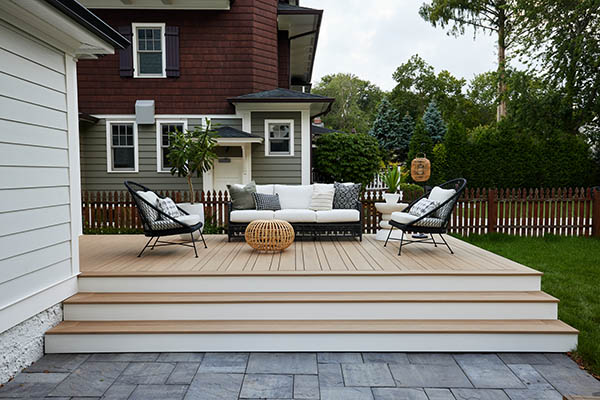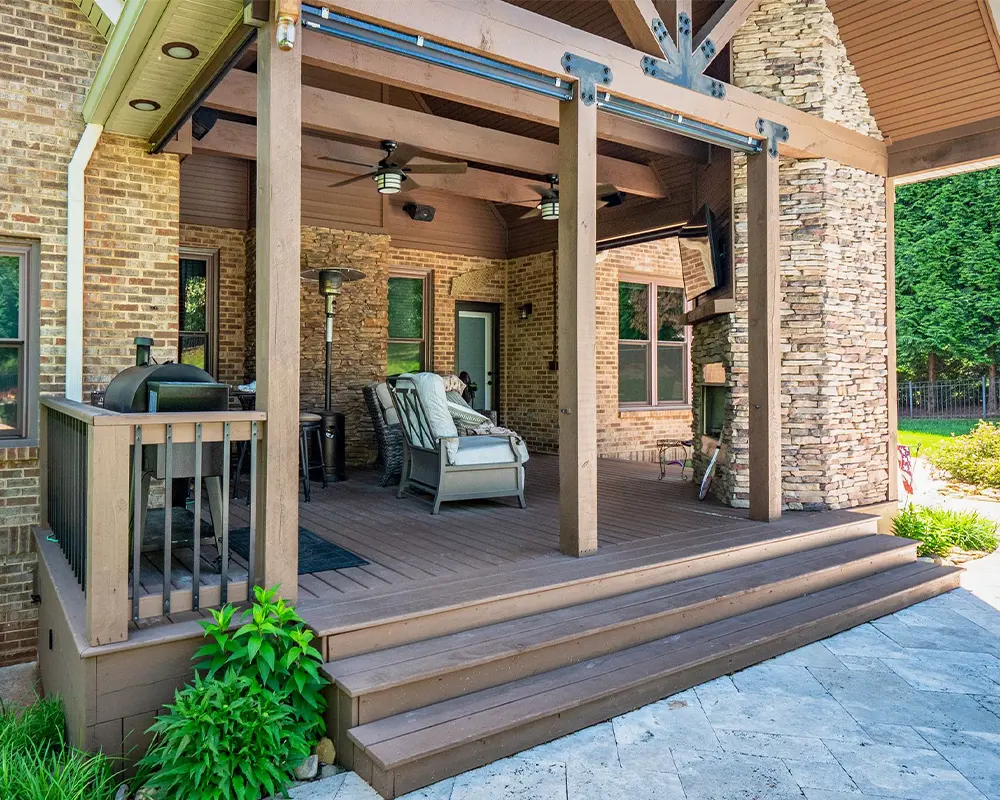Exactly how to Select the Right Products for Your Deck Setup Task
Picking the proper products for your deck setup project can appear challenging. The key is to stabilize your budget plan, style choices, and way of living needs to produce a deck that will improve your outside room for years to come.
Recognizing the Different Sorts Of Deck Materials
When embarking on a deck setup job, the selection of materials becomes an essential choice. Composite materials, on the other hand, are a blend of timber and plastic, giving resilience and resistance to weather aspects. By recognizing these differences, homeowners can make a much more educated choice on the most ideal deck product for their specific needs.
Assessing the Sturdiness and Upkeep Needs of Deck Products
Analyzing the durability and maintenance needs of deck materials is an important action in deck setup. Resilience includes the product's capability to stand up to extreme weather condition problems, deterioration, and its durability. Cedar and redwood are normally immune to rot and bugs, making them long lasting options. On the other hand, pressure-treated wood, while sturdy, might need more maintenance as a result of its sensitivity to splitting and contorting.
Understanding maintenance needs is similarly essential. Some products need regular securing or discoloring to maintain their look and resist dampness damage, while others, like composite outdoor decking, require less maintenance. By evaluating these variables, one can select the most ideal decking product, making sure a balance in between sturdiness, maintenance requirements, and aesthetic charm.
Cost Analysis: Contrasting Wood and Compound Decking
Although cost might initially look like a secondary worry, it is a significant aspect when comparing wood and composite outdoor decking. Wood, normally a cheaper alternative, has a lower in advance price. However, gradually, upkeep costs can gather, potentially making timber extra costly in the future. These upkeep costs may consist of discoloration, securing, or replacing damaged boards. On the various other hand, composite outdoor decking, while costlier initially, needs much less upkeep, possibly reducing long-lasting prices. Yet, it's essential to bear in mind that composite decking isn't unsusceptible deterioration, and substitute prices can be high. Possible deck proprietors have to consider their spending plan and willingness to maintain their decks when deciding between timber and composite outdoor decking.
Appearances and Layout Adaptability of Decking Products
All-natural timber decking offers a traditional, ageless appearance, while composite products supply a broad variety of colors and structures to match varied preferences and styles. Composite materials, while less flexible in style, are still versatile sufficient for a lot of deck styles. These aspects, consequently, are essential factors in the selection of outdoor decking product.
Ecological Impact of Decking Products
When picking outdoor decking products, one have to consider not just aesthetics and sturdiness, however likewise the ecological impact. It is essential to assess the sustainability of materials and explore recycled outdoor decking options. Furthermore, comprehending the potential influence on neighborhood environments will make sure an extra environmentally accountable choice.
Evaluating Material Sustainability
In the realm of deck building, analyzing material sustainability is a critical step. Composite outdoor decking products frequently integrate timber and plastic, decreasing the demand for brand-new hardwood but enhancing dependence on fossil gas - deck installation near me. Therefore, the selection of decking products ought to stabilize performance, visual appeals, price, and sustainability to make sure a responsible and lasting setup.
Recycled Decking Options

Compound outdoor decking is specifically preferred as a result of its durability and simplicity of maintenance. It's immune to rot, insects, and fading, making it a resilient alternative. Recycled plastic outdoor decking, on the various other hand, is extremely resilient and requires minimal maintenance. While these materials may carry a higher preliminary price, their long life and decreased environmental influence make them a wise investment for the eco-conscious house owner.

Effect On Local Communities
While the advantages of utilizing recycled materials for outdoor decking can not this contact form be overemphasized, it's equally important to think about the wider environmental implications of these selections. The removal, handling, and transportation of materials can greatly affect regional ecological communities. Logging for timber decking contributes to habitat loss and environment adjustment. Even the manufacturing of composite materials can have a peek at these guys launch harmful discharges. Conversely, utilizing recycled or sustainably sourced products can aid reduce these impacts. Thinking about the lifespan of materials can lower ecological influence; longer-lasting alternatives call for much less constant substitute, therefore preserving sources. Ultimately, correct disposal of old decking is vital to reducing landfill waste (deck installation near me). Basically, an eco-conscious deck job needs cautious material selection, lasting sourcing, and responsible disposal.
Making Your Final Choice: Tips for Choosing the very best Deck Products
As the short article transitions right into the subtopic of "Making Your Decision: Tips for Picking the very best Deck Products", it is vital to understand the selection of deck materials available. Striking a balance between durability and aesthetic appeal is vital in this choice process. The following conversation will lead visitors in making an enlightened selection based upon these vital factors to consider.
Understanding Various Deck Products
The job of choosing the ideal materials for your deck setup can appear daunting because of the large variety of options offered. Nonetheless, understanding the different products can simplify this process. Timber is a preferred choice, using a timeless aesthetic and cost. Kinds of timber used include pressure-treated lumber, cedar, and redwood. Composite products, made from a mix of timber and plastic, are low-maintenance and resistant to rot and pests. Plastic or PVC decks are much more durable and require less maintenance than composite products, yet they can look much less all-natural. Lastly, aluminum decks are strong, lightweight, and immune to rot, however they are additionally one of the most expensive option. Each material has its own advantages and downsides, making it essential to consider your certain requirements before making a decision.
Toughness vs. Aesthetics Balance
Stabilizing longevity with appearances can be an obstacle when choosing deck materials. The decision usually comes down to individual preferences and the deck's intended usage. High-traffic locations may necessitate sturdy products like composite decking, which stands up to deterioration but might lack the natural elegance of wood. On the other hand, wood offers a classic charm and heat that artificial materials battle to duplicate. It requires extra maintenance and might not last as long. House owners need to strike an equilibrium, considering both the deck's functional demands and their visual preferences. By doing so, they can ensure their deck stays a useful and attractive outside room for many years ahead.
Conclusion
Finally, choosing the right materials for your deck installment task calls for cautious factor to consider of aspects such as resilience, upkeep, expense, looks, and ecological effect. Whether you select conventional wood or composite products, your option must line up with your spending plan, style choices, and way of life. Ultimately, the very best decking product is one that improves your outdoor room and gives pleasure for years to come.